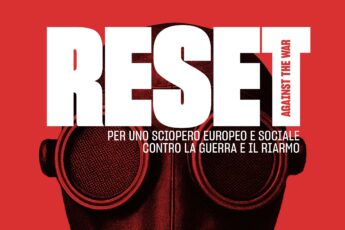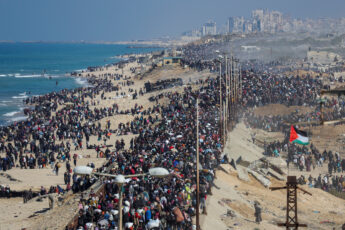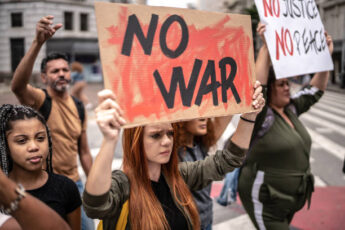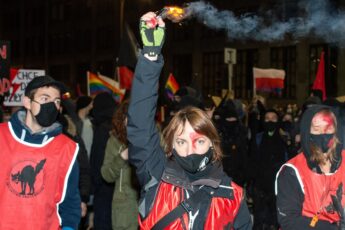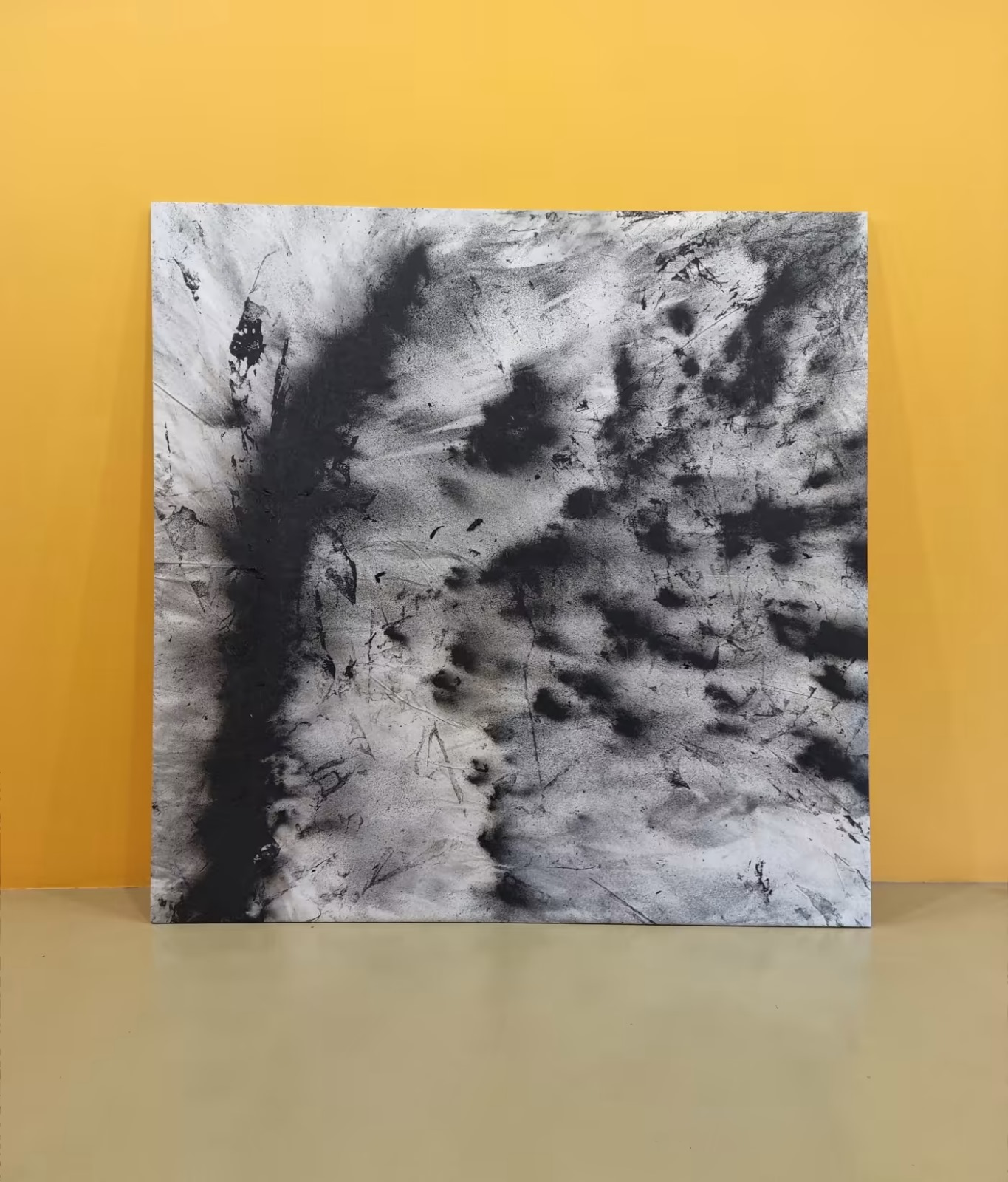
by PERMANENT ASSEMBLY AGAINST THE WAR
In the Permanent Assembly against the War (PAAW), we have insisted that as social movements, activists, unionists, workers and migrants we need to engage in a continuous collective discussion to organize our refusal of the war and the slide towards wider wars that has been evident since the Russian invasion of Ukraine and now with the Israeli war on Gaza. After October 7th, this is even more urgent, and the assembly scheduled during the Bologna meeting (Saturday 28th at 6pm) will be the occasion to continue our collective elaboration on what a transnational politics of peace might mean in these dreadful times.
Since October 7th, the movements have been torn apart by different assessments of how to frame what happened. The attack led by Hamas on October 7th has been composed by different actions: barriers have been broken down, military outposts have been attacked, houses have been stormed. Hundreds of soldiers have been killed, and many more men, women and children have been massacred, provoking horror among many. At the same time, we know that October 7th needs to be contextualized within the decades of occupation and violence by Israel and the challenges faced by the Palestinian resistance. The tension between these two elements has sparked discussions on the meaning and limits of resistance. These discussions are now overwhelmed by the fog of war and the killing of thousands of Palestinians by Israeli bombing, but they remain politically relevant in the process of building a different future for Gaza, for Palestinians and for all of us.
This document proposes some lines of reasoning to frame this issue in a way that does not surrender to the alternative either with Hamas or with Israel, and tries to overcome the existing fronts and homogenizing logics, insisting on pushing forward a transnational politics of peace where the claims and struggles carried out by women and men, workers, migrants, LGBTIQA+ people, against oppression, exploitation, patriarchy, racism and for a climate justice, can find space and voice. Our aim is to prevent political deadlocks while acknowledging the existence of different positions as a symptom of the complexity of a situation that neither requires nor allows any simplification. The PAAW is an open space free from the obligation of reasoning within readymade alternatives, readymade friends and foes, and liberating the potential of an open discussion without fear of cross-accusations.
We know that nothing can ever justify the blind massacre enacted by the Israeli State in Gaza. We cannot accept it, we must oppose it, and we must refuse it with all our strength. The pro-Israeli narratives, the identification of Palestinians as terrorists or as animals, and the repression of dissent in some Western countries are silent and complicit with a whole history of oppression. All discussion must follow a clear statement in support of the claim for an immediate end of the massacre and of Israel’s occupation and apartheid on Palestinians.
This stance is however not enough. We must dare to ask: can we do something more than express outrage for what Israel is doing, with the support of the US, UK, the EU and other Western governments? Can we do something more than expressing solidarity with those who are under massive and indiscriminate shelling, than calling for an activation of State diplomacy, which is revealing itself not only powerless but also complicit with the present massacre?
Though we are not in Palestine, we recognize the history of oppression of Palestinians. We also know that the history of the Palestinian resistance and occupation has undergone significant transformations in the last decades, which has brought Hamas to the forefront. However, while many support Hamas in its resistance to occupation, not all identify themselves with Hamas’ political project and methods. To support the Palestinian demands for liberation does not necessarily mean to support Hamas. The history of oppression and the continuous military aggression have not left much space for peaceful resolution of conflicts and we know that resistance may include some form of violence. However, we must also recognize that not all violence is on our side and mass slaughter is definitely not.
We know that many in the murderous front supporting Israel are using the distinction between Hamas and the Palestinian people to crush any claim for liberation and represent a picture of victimization and peaceful resignation, knowing that only unilateral submission will please the Israeli government. Here pacification means just crushing all struggle against occupation or ethnically cleansing the region of Gaza. We also know that the identification of Palestinians with terrorism is used all over Europe to justify increased police control, anti-migrant politics, and violence. We need to part clearly from those positions and escape simplifications by articulating a stance that is closer to the complexity of the actual material reality of struggles: there are different understandings within Palestine of what resistance means and what it is to be done; there are hundreds of thousands of Palestinians in Europe that have decided to continue their resistance and are bridging the outcry against the massacre in Gaza with the fight against institutional racism and exploitation in Europe. The march of 300.000 people in London proves that, so much so the squares in other places overcoming bans and accusations of fundamentalism and anti-semitism. There are hundreds of thousands people rising up in the Arab countries, calling for the end of Israeli occupation, denouncing the complicity of their own and of Western countries with Israel. There are thousands of Jews who do not identify with Zionism and the Israeli government and are seeking connections beyond any religious or national identity. We need to detect the seeds of struggles for liberation that go beyond ethnic pride and religious belonging in all various outcries of rage.
A transnational politics of peace is neither pacification nor simply pacifism, we don’t want to engage in abstract debates on violence as such, but we want to push for a perspective that enables us to establish a political communication across the fronts, to produce organization starting from social struggles for making the opposition to war something more than a simple movement of opinion. After Russia invaded Ukraine, we spoke of a Third World War scenario. Though this definition was and continues to be a topic of discussion and even disagreement, since not all the States in the world are militarily involved in the war, its aim is to highlight both the radical discontinuity in the world disorder marked by the war in Ukraine and the effects of the war beyond the battlefield, together with the logic of war which is shaping not only the policies of all nation-states but the material lives of millions of proletarians around the world. The possibility of speaking of war in relation to what is happening between the Israeli State and the Palestinian population is even more controversial, since – according to its definition in relation to international law – a “war” is assumed to be a symmetrical confrontation between nation-states. Clearly, this is not the case of the Israeli-Palestinian confrontation, since Palestinians do not have a State, and are in a condition of occupation. To presume a symmetry by calling this a war, can mean to hide decades of colonization, violence, and oppression enacted by the Israeli State, thus implicitly denying the asymmetry. To talk about an ongoing war is used by some to defend the legitimacy of Israel bombing Gaza as a “defense” or to kill thousands of Palestinians with the excuse of militarily destroying Hamas. In turn, to refuse to call this a war can hide the fact that, in spite of the asymmetry between regular army and more or less informal militias, a kind of affinity is actually in place. Not between the Israeli State and Palestinians, but between the Israeli State and Hamas’ rule – which organizes state functions in Gaza – and political ambitions: both share a religious-based program of action, both regard the State as the only horizon for self-determination. Moreover, Hamas financial and military supporters outside Palestine, such as Iran, are engaging in a politics of war that is aimed at increasing their role in the region more than at the well-being and freedom of Palestinians, so much as the alliance between the US and Israel on the other side.
For us it is not just a matter of recognizing the potential for escalation, which is already manifest both regionally and globally, but to counter the drift towards the generalized imposition of the politics of war. What does it mean? It means to highlight that, in different contexts, the logics of war is operating by closing spaces for dissent: in France and Germany we see the prohibition and repression through police violence of pro-Palestinian demonstrations, and attacks on Arabs and Jews people; after the war in Ukraine had legitimized a hierarchization among those migrants who are allowed to enter the EU, and those who must be refused or admitted as illegalized labor force, a new upsurge of institutional racism is manifest in the identification of Muslim migrants as potential terrorists which justifies the suspension of Schengen along the Balkan frontier, and supports the claim for more detention centers and militarization of borders; after the war in Ukraine radically worsened the working class living conditions by reducing the value of wages, today also what is happening in Israel and Palestine is instrumentalized by Western governments for imposing more austerity and more militarization. This is not a homogeneous process, as in different countries – from Germany to Italy and Georgia, from France to Turkey and the US – it responds to the differently articulated political needs of suppressing any form of social opposition. This holds true also for social struggles in Arab countries, from Tunisia to Egypt and Iran, where the strategy of suppression of social movements finds today a useful ally in the collective outcry against Israel.
The question we want to address is how to refuse the representation of opposing fronts as internally homogeneous imposed by the logic of war. Behind all presumed homogeneity, there is an internal opposition to Netanyahu’s authoritarian and colonial policies, which is not by chance violently repressed by the government; there exists a solidarity between Jewish people who do not identify with their State and the Palestinians; there are thousands of Palestinians who, though aspiring to the end of the occupation, are not embracing arms but are forcedly displaced; there were protests in Gaza against Hamas’ confessional project; there are Jewish people who, around the world, are protesting against the racist politics of Israel, while the Palestinians, Arab or Muslim people protesting for the immediate end of Israeli massacre run the risk of being enrolled into unbearable racist, ethnic or religious oppositions. In all these struggles, protests, and contestations we should find resources for a political communication, which could pave the way for a solidarity on the side of the oppressed in Palestine while pointing to possibilities of a transnational politics of peace as a terrain of organization among different subjects against the politics of war. Our claim of not accepting fronts as given and fighting across fronts may seem impossible. But to us for that very reason, it seems realistic. And anyway, as someone said a few decades ago: we must be realistic and demand for the impossible.
We therefore propose to discuss the following questions in Bologna:
How do we develop our unquestionable stance for the end of Israeli occupation into a perspective which enables us to avoid the friend-enemy logic? How do we link the situation in the Middle East with what we learned after more than one year and half of war in Ukraine? How do we understand the spreading of the politics of war beyond one specific context? How do we go beyond the emergency, without limiting ourselves to claiming peace, but organizing struggles that make peace a possibility of wider emancipatory politics? How do we connect the future of territories under bombing and siege with the future of women, migrants, and the transnational working class?


